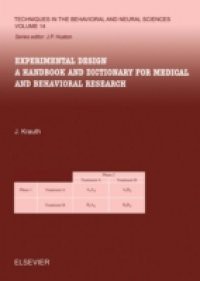Scientists planning experiments in medical and behavioral research will find this handbook and dictionary an invaluable desk reference tool. Also recommended as a textbook for students of Experimental Design or accompanying courses in Statistics. Principles of experimental design are introduced, techniques of experimental design are described, and advantages and disadvantages of often used designs are discussed. This two-part volume, a handbook of experimental design and a dictionary providing short explanations for many terms related to experimental design, contains information that will not quickly become outdated.

